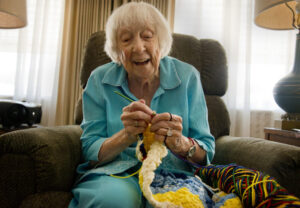
Many people make assumptions about aging, what it is like to grow “old”, and how older age will affect them. But as we are getting older, it is important to understand the positive aspects of aging. Research has shown that you can help preserve your health and mobility as you age by adopting or continuing healthy habits and lifestyle choices.
Depression and loneliness are normal in older adults.
As people age, some may find themselves feeling isolated and alone. This can lead to feelings of depression, anxiety, and sadness. However, these feelings are not a normal part of aging as growing older can have many emotional benefits, such as long-lasting relationships with friends and family and a lifetime of memories to share with loved ones. In fact, studies show that older adults are less likely to experience depression than young adults. So, when should you be concerned? It’s important to remember that older adults with depression may have less obvious symptoms or be less likely to discuss their feelings. Depression is a common and potentially serious mood disorder, but there are treatments that are effective for most people.
The older I get, the less sleep I need.
As people age, they may find themselves having a harder time falling and staying asleep. A common misconception is that a person’s sleep needs decline with age. Older adults need the same amount of sleep as all adults — 7 to 9 hours each night. Getting enough sleep keeps you healthy and alert. Adequate sleep can also help reduce your risk of falls, improve your overall mental well-being, and have many other benefits.
Older adults can’t learn new things.
Not true! Older adults still have the ability to learn new things, create new memories, and improve their performance in a variety of skills. While aging does often come with changes in thinking, many cognitive changes are positive, such as having more knowledge and insight from a lifetime of experiences.Trying and learning new skills may even improve cognitive abilities. For example, one study found that older adults who learned quilting or digital photography had improved memory. Seeking out new social connections with others and engaging in social activities, such as a dance class or book club, can keep your brain active and may also boost your cognitive health.
Dementia is not a normal part of aging.
Although the risk of dementia grows as people get older, it is not inevitable, and many people live into their 90s and beyond without the significant declines in thinking and behavior that characterize dementia. Occasionally forgetting an appointment or losing your keys are typical signs of mild forgetfulness, which is very common in normal aging. Nevertheless, you should talk with a doctor if you have serious concerns about your memory and thinking, or notice changes in your behavior and personality. These problems can have a range of different causes, some of which are treatable or reversible. Finding the cause is important for determining best next steps.
Older adults should take it easy and avoid exercise so they don’t get injured.
As you age, you may think exercise could do more harm than good, especially if you have a chronic condition. However, studies show that you have a lot more to gain by being active — and a lot to lose by sitting too much. Often, inactivity is more to blame than age when older people lose the ability to do things on their own. Almost anyone, at any age and with most health conditions, can participate in some type of physical activity. In fact, physical activity may help manage some chronic conditions. Exercise and physical activity are not only great for your mental and physical health, but can help keep you independent as you age. Tai Chi and similar mind and body movement practices have been shown to improve balance and stability in older adults and this can help maintain independence and prevent future falls.
